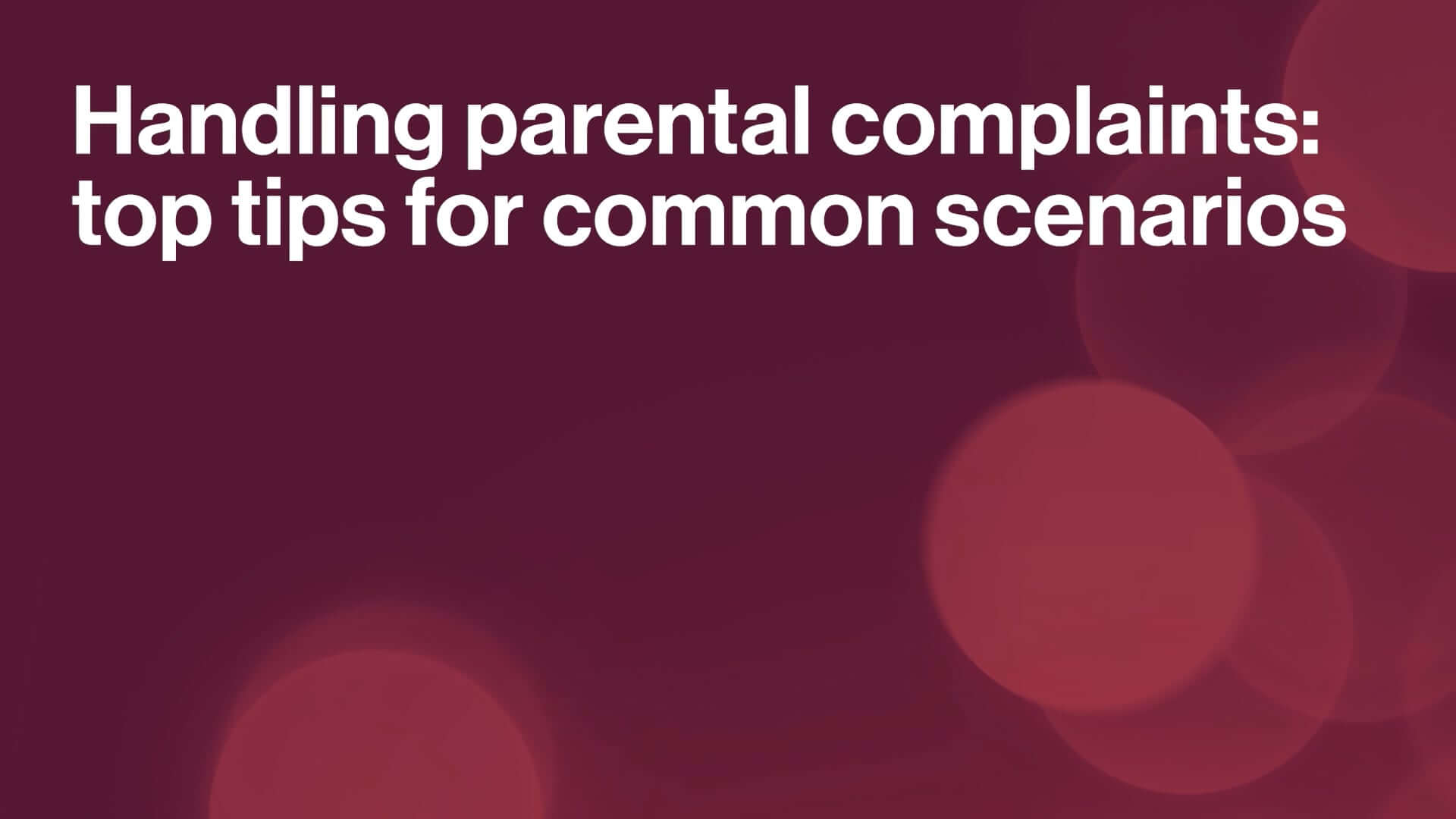There’s now greater opportunity than ever for parents, carers and guardians to voice any concerns they have relating to their child’s education and for their concerns to be heard and to be taken seriously.
While most staff are aware of their legal duties relating to academy and school complaints procedures, many are reporting a significant increase in the workload generated by the volume and complexity of parental complaints they receive.
Handling complaints about schools with the appropriate due diligence can generate a substantial overhead. This is all too often exacerbated when Ofsted or a local authority are involved, or on escalation to the Department for Education and the Education and Skills Funding Agency (ESFA).
We recognise the challenges complaints about schools and trusts poses and we’re frequently asked to advise and help to successfully resolve complex school complaints. We want to do more to reduce the number of complaints about schools that reach that stage and to help reduce the impact this can have on school capacity.
For further information download our Complaints Management support brochure.
Frequently asked questions
Complaints about bullying may involve multiple school policies and procedures, including complaints, anti-bullying, behaviour and safeguarding. The starting point is to review each of these to gain clarity on what steps the school has committed to undertaking. It will worsen the complaint if the school fails to follow its own processes and procedures in relation to allegations of this nature.
Allegations of bullying should always be taken seriously and should involve an investigation into the allegations made. Some investigations will be straightforward, involving a discussion with the alleged victim and alleged perpetrator, and resolved quickly.
Others will be more complex, particularly where they involve multiple alleged perpetrators, bullying of a sexual nature, or allegations of bullying outside of school, such as on social media. In some cases, the matter may have already been reported to the police by the alleged victim’s parents.
In complex situations, it is easy to overlook the complaints process. As with any complaint, it is important to acknowledge receipt of the complaint, keep the complainant updated on the progress of the investigation, and give clear timelines for responding to the complaint. In our experience, inadequate communication with the complainant is a common reason why complaints are escalated.
It is unlawful to discriminate against anyone because of or in connection with a ‘protected characteristic’, which includes age; gender reassignment; being married or in a civil partnership; being pregnant or on maternity leave; disability; race; nationality; ethnic or national origin; religion or belief; sex or sexual orientation. There are also additional obligations to make reasonable adjustments to avoid disadvantage for people with disabilities.
Common complaints of this nature include complaints about the school’s uniform policy, or the application of the school’s behaviour policy to children with particular SEN needs.
As with complaints about SEN, complaints which relate to discrimination should be taken seriously and handled carefully, and you should consider taking legal advice. You will need to refer to the requirements of the Equality Act 2010, the Equality and Human Rights Commission’s Technical Guidance for Schools in England (which has recently been updated) and the DfE guidance on the Equality Act 2010: advice for school leaders, school staff, governing bodies and local authorities.
Escalation of discrimination issues is a particular risk for schools, resulting in potentially time-consuming and expensive litigation in the County Court or SEND Tribunal as well as highly negative reputational impact.
You will want to ensure that you are acting in line with your policies and procedures, such as those regarding uniform and religious observation. You should also consider whether these policies could be considered discriminatory.
We can assist with a review of school policies in this context, or you may like to consider adopting our model policies and procedures which have been designed with these requirements in mind.
Complaints about the school’s provision and support for pupils with special educational needs (SEN) are increasingly common and require consideration of compliance with the law on SEN, including the SEND Code of Practice, the Children and Families Act 2014 and the school’s policies and procedures for supporting pupils with SEN. Some (but not all) pupils with SEN will also be considered disabled under the Equality Act 2010 (see below).
The school’s SENCO will be a valuable contributor to the complaint investigation process. However, where the complaint relates to the SENCO or the complaint is particularly complex, you may wish to take legal advice before responding.
Where complaints about SEN are not resolved, parents may seek redress in the SEND Tribunal. In view of this, it is particularly important that you keep detailed records of the complaint investigation, including conversations and input sought, both internal and external, and look for opportunities to resolve the concerns where this is possible.
In our experience, face-to-face meetings are more effective at resolving complaints than protracted exchanges of emails or letters.
Complaints about members of staff may invoke the complaints procedure and the staff disciplinary process.
Your complaints policy should indicate how these kinds of complaints from parents will be handled. Our Model Complaints Procedure states that:
“Certain complaints about staff may need to be dealt with under the school’s internal disciplinary procedures, if appropriate. Complainants will not be informed of any disciplinary action taken against a staff member as a result of a complaint. However, the complainant will be notified that the matter is being addressed.”
The appropriate policy to follow will depend on a range of factors, including the nature of the complaint and whether it includes alleged breaches of school policies by a member of staff, or amounts to an allegation of potential misconduct in accordance with the school’s disciplinary rules.
It may be that some initial fact-finding is needed before deciding under which process to look at the complaint. If you are in doubt about which process to follow, you should seek legal and/or HR advice.
Remember that complaints about staff which raise pupil safeguarding concerns must be dealt with appropriately under the school’s safeguarding procedures and allegations procedures, and in line with the DfE’s Keeping children safe in education guidance.
Top tips for common scenarios
Victoria Hatton and Tamara Dasht share some top tips for common parental complaint scenarios.

Key resources
School complaint management - exploring a new way forward
Insight
"With potential changes to the regulation of academy complaints proposed in Sir David Bell’s review of the ESFA, we ran a round table event with leaders from across the sector."Read more

Complaints management support pack
Product
"Our suite of resources and supporting guidance help you handle each step of the complaints process effectively and efficiently."Find out more

Best practice complaints management for schools and academy trusts
On-demand webinar
"We share some real life examples and top tips for managing the complaints process with plenty of opportunities for you to ask questions along the way."Watch now

Testimonials
"In a year when complaints have put the Academy under such pressure, the complaints pack provided good support."
“We have been so impressed by the service of Browne Jacobson, on the two occasions we have really needed support, as well as the Quickcall support.”
Key statistics
Our expertise
A vexatious complaint
The CEO of a multi academy trust asked for advice regarding a parent raising multiple complaints, insisting each be investigated and responded to separately. We advised on whether the school could refuse any further complaints from this parent under the terms of their vexatious complaints policy.
A problem parent
A school shared concerns regarding a complaining parent, whose manner towards staff was rude and abrupt. The parent’s conduct was not acceptable so we advised on how they should inform the parent, record evidence and set out the steps that could be taken if the behaviour continued.
Key contacts

Victoria Hatton
Partner

Tamara Dasht
Associate
You may be interested in...
Legal Update
Data (Use and Access) Act 2025: Key changes now in force
In Person Event
NAHT Regional Roadshow 2026: London
Legal Update
Ofsted confirms changes to inspection framework
Legal Update
Schools White Paper: SEND reform, behaviour changes and other expectations
Legal Update
Be prepared for the 2025-26 school year
Opinion
Updates to academy trust governance: A missed opportunity?
Legal Update
As FOS frustration grows, a judicial review offers hope
Legal Update
Data (Use and Access) Act 2025: What schools and trusts need to know
Legal Update
Top tips for schools handling AI generated complaints
Legal Update
Navigating SARs in schools
Press Release
Education predictions: What does 2025 have in store for schools, trusts and universities?
Press Release
An interview with HSBC’s ex-commercial manager
On-Demand
School complaints: handling problem parent behaviour
Press Release
Browne Jacobson’s school leaders survey illustrates rising volume of parental complaints and impact on teachers
Legal Update
OFS Consultation on freedom of speech guidance
Legal Update
New case on the reasonable adjustment duty for pupils in schools
Published Article
Proactive handling of vexatious complaints and abuse of staff in schools
Published Article
Navigating parental complaints in turbulent times
Published Article
Parental complaints surge: how can schools stay afloat?
Legal Update
Are parental complaints to schools undermining staff retention?
Legal Update
Lessons learnt: Handling a vexatious complaint - case study
Legal Update
The role of Ofsted in school complaints
Legal Update
Back to school – prepare to make light work of managing complaints
On-Demand
Best practice complaints management for schools and academy trusts
Legal Update
The Academies regulatory review and school complaints
Legal Update
New support launched to manage school complaints
Legal Update
Complaints management in schools - exploring a new way forward
Opinion
School complaints culture and staff support
In this article we set out some of the support that's available to schools in a bid to reduce the overhead that complaints management generates.
Legal Update
Parental complaints that involve mental health issues
Given the symptoms of mental health problems it is not surprising that they can sometimes seem to evidence themselves in the complaints process. Does this change your approach and how do you deal with parents who appear to exhibit signs of poor Mental Health?
Legal Update
Is your school complaints process fit for purpose?
As part of the advisory service we offer schools, recent enquiries have arisen from academies being contacted by the Department for Education (DfE) about their complaints policies.































